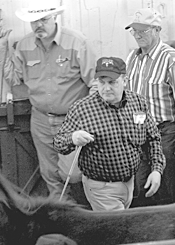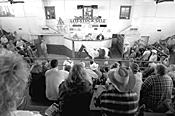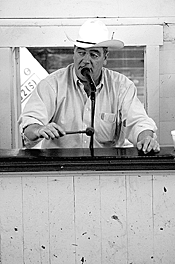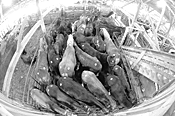denise.grollmus@clevescene.com
|
Sunlight beams through slits in the stable walls as he looks down upon the maze of dusty pens. The small ones hold groups of young steeds and mares. The larger pens, about 10 by 15 feet, are packed with as many as 30 less-desirables.
Baker frowns as he pulls back the cuff of his cowboy shirt, gazes at his watch, and shakes it. He's agitated. Today's auction is an hour behind schedule. "I'm all business about this stuff," he says in his farmer's drawl. "That's why people don't like me. I'm not a popular man."
His impatience isn't why he's disliked.
Baker owns Sugarcreek Livestock Auction in Sugarcreek, one of the largest slaughter-horse auctions east of the Mississippi. He also buys horses. Every Friday, around 200 horses are put up for sale. Almost half are sold for meat to buyers like Baker.
Needless to say, it's not a popular trade. Though Americans will readily eat cows, pigs, chickens, and fish, there's something unseemly about eating animals largely considered pets. No one wants a Fido burger for lunch. No one wants Black Beauty for dinner.
Yet here in the heart of Amish country, where the land and its creatures are one big natural resource, such citified squeamishness is for the foolish. To a good farmer, wastefulness is a sin; you make use of everything you can.
Which has made Baker's auction a major supplier of the American horsemeat industry. Each year, roughly 60,000 horses are slaughtered for meat. Nearly all of it is sold overseas, to countries like France, Belgium, Italy, and Japan, where horse is a delicacy. With mad-cow disease posing a serious threat, horsemeat is a welcome low-fat, high-protein substitute for beef. Its flavor is a cross between beef and venison, slightly sweeter in taste, and surprisingly tender. And the U.S. is the world's largest provider.
Baker, however, is among the rare persons who will talk about it. For obvious reasons, this is a trade that stays well below the radar. Nearly every other meatpacking industry has been attacked with protests, boycotts, and charges of cruelty and neglect. One can only imagine the outcry against the eating of Mister Ed. Many states have already criminalized the trade.
But Baker feels no shame, no reason to hide. Welcome to his auction.
Four tiers of bench seating are packed with more than 400 people. Some eat sloppy joes and Skittles from the refreshment stand, while Amish men sip coffee from Styrofoam cups.
Auctioneer Dean Beachy rattles off bids for saddles and feed buckets. It's clear that owning a horse isn't a poor man's hobby.
On average, it costs $11,000 a year to stable, feed, immunize, and insure a horse. That's akin to a year's tuition at St. Ignatius. Not surprisingly, many owners take on more than they can afford. And when money gets tight, the horse is the first to go. "We get a lot of horses from people who just can't afford to feed them," Beachy says.
Most of the meat horses are crippled or crazy, too dangerous to keep. Some are ancient Amish buggy horses or failures at the track. Others are simply unwanted pets.
In the best of all worlds, Beachy acknowledges, there would be a home for all. Yet the laws of economics always intrude.
These days, the horses he sees look worse than usual. Most of them are half-starved due to owner neglect. "Instead of starving them to death, do them a favor," Beachy says. "There just aren't enough homes for these horses, so what are you supposed to do about it?"
Those sold for slaughter go for $150 to $400, depending upon their heft. They're then sold to one of three U.S. slaughterhouses -- two in Texas and one in Illinois -- for 80 cents a pound. After the meat is processed, it can fetch as much as $15 a pound.
Baker, a dairy farmer by trade, has operated the auction house for 19 years. Not all of Sugarcreek's horses are sold for food. Many go to private homes and dealers. Of the hundreds of people who gather here each Friday, only two or three will be meat buyers, he says.
Mindy Thompson isn't one of Baker's fans. She runs a foster farm in Alliance for Bright Future Farms, a New York equine-rescue network. The organization focuses on outbidding meat buyers at auctions around the country. It then rehabilitates the horses and puts them up for adoption. "Not all of these horses are bad, three-legged things that can't be used," she says. "A lot of them are just unwanted."
Last year, Thompson purchased a colt for $175 at Sugarcreek. "There wasn't anything wrong with him, except that he was almost starved to death by his owner," she says.
In the time-honored conflict between the food chain and animal rights, Thompson argues from the latter viewpoint. "The slaughter facilities are designed for cattle," she says. "The horses don't die quick and painlessly. And they're transported all the way to Texas without food or water."
The auctions, she says, are nothing short of barbaric. "It's hard to watch. It's a big day out for some people. The place is packed, while these poor horses are being herded into small cages with sticks. It's like it's some spectator sport or big social event."
Nonetheless, activists appear to be winning the war. In 1988, more than 340,000 horses were slaughtered in the U.S. By last year, the number had fallen to 65,000.
Possession, sale, and shipment of horsemeat for human consumption are felonies in California. Three years ago, Pennsylvania enacted a law that prohibited the mass transportation of horses, designed to stop the meatpackers. The law was passed on a Friday. The following Tuesday, Baker was awaiting a shipment of horses, which was quickly intercepted by Pennsylvania troopers and delivered to animal refuges. He was out $23,000. Even Ohio has a pending bill to outlaw the sale of horses for slaughter.
"These activists cold-check me any way they can," Baker says. "The funny thing is that half those horses that were supposedly rehabilitated got back to the auction anyway, because no one wanted them."
Though Beachy finds the activists noble, he possesses a rural pragmatism. "There are several adoption agencies with hundreds of horses, and they don't know what to do with them," he says. "We're not trying to be barbaric, but what are we gonna do with all these horses?"
Ohio and Pennsylvania are the nation's two largest providers of meat horses. That's partly due to both states' large Amish communities. When buggy horses get too old or feeble, the Amish sell them at auction.
Such practices are at the crux of the conflict. Thompson is most critical of Amish treatment of animals. "They're hard workers who work their horses even harder," she says disapprovingly.
Others might argue that they're merely practicing centuries-old environmentalism by using the horse for every purpose it can serve. "If you want to feed a horse until he's 40, by all means do it," says Beachy. "But it's not reasonable for everyone."
Baker understands the objections to his work. Last year, he received a shipment of horse filets from a Canadian slaughterhouse. He served them to employees at his auction office. "They enjoyed it, until I told them it was horsemeat," he says. "One woman cried, and another gagged."
That's why Baker is among the few who will talk about the trade. Most horse buyers shy away from the press, fearing it's in league with the activists. In fact, almost all information about the industry comes from animal-rights groups. The buyers and sellers prefer to lie low, hoping they'll be left alone.
"What kind of magazine are you?" one buyer asks defensively when approached by a Scene reporter. "A porno mag? That's the only magazine I'm interested in talking to."
Inside the stables, a slaughter-horse seller, who doesn't want his name printed, pulls a dappled thoroughbred from a pen to show a prospective buyer. As the horse makes its way down the aisle, it jerks its head frantically, kicking everything in its reach. The buyer walks away nervously. "You're Taco Bell," he tells the horse. "That horse is crazy in the head. All it wants to do is hurt people. What good is that?"
Across the way stands a saddled Tennessee Walker named Lightning. She belongs to Jeff Rine, who can't afford her anymore. "I don't have the time or the money," he says.
Rine hopes she'll find a good home. He's paid one of the stable girls to ride her into the auction, in hopes that she won't be snagged up by a meat buyer.
In the auction room, Baker and his son stand on opposite sides of the ring with long sticks, as Beachy announces the bids from a booth overhead.
It's not exactly clear which horses are being sold for meat, but Toni Bertini, a gray-haired woman who deals in mules, has a good idea. "That one is old enough to vote," she says of a Belgian workhorse that goes for $200.
A pony with jutting ribs enters the ring. "That guy has a bad head on him, and he's poorly put together," Bertini says. The horse goes for $175.
Almost all the horses in the first part of the auction sell for under $400, which means that they'll probably go for slaughter. Baker buys many of those that fall below $275.
Rine's Tennessee Walker comes into the ring. Beachy reads Rine's sales pitch -- good around children, gentle, immunized. Lightning goes for $750 to a woman in the stands.
The next horse isn't so lucky. It goes for $250. "All that colt needed was to be fattened up," Bertini says. "The question is, who can afford to do it?"
| clevescene.com | originally published: May 4, 2005 |



